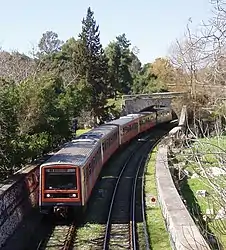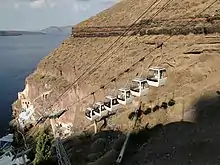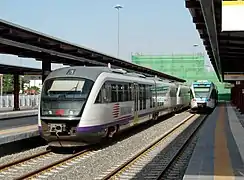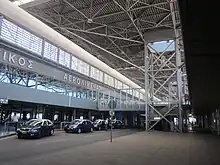| Economy of Greece |
|---|
 |
| Overview |
| History |
| Related |

Transport in Greece has undergone significant changes in the past two decades, vastly modernizing the country's infrastructure and transportation. Although ferry transport between islands remains the prominent method of transport between the nation's islands, improvements to the road infrastructure, rail, urban transport, and airports have all led to a vast improvement in transportation. These upgrades have played a key role in supporting Greece's economy, which in the past decade has come to rely heavily on the construction industry.
Cable transport


Rail transport
Railways
- total: 2,571 km (1,598 mi), (764 km or 475 mi are, or will be, electrified)
- standard gauge: 1,565 km (972 mi) 1,435 mm (4 ft 8+1⁄2 in) gauge
- narrow gauge: 961 km (597 mi) 1,000 mm (3 ft 3+3⁄8 in) gauge; 22 km (14 mi) 750 mm (2 ft 5+1⁄2 in) gauge
- dual gauge: 23 km (14 mi) combined 1,435 mm (4 ft 8+1⁄2 in) and 1,000 mm (3 ft 3+3⁄8 in) gauges (three rail system) (2004)
The state-owned company that owns and maintains Greece's railway network is OSE, while Hellenic Train is the company responsible for operating all passenger trains and the most freight trains.
Metro

Cities with a rapid transit railway network:
- Athens Metro (3 lines) (another one under construction)
- Thessaloniki Metro (2 lines) ( both under construction)
Commuter rail

Cities with a commuter rail network (Proastiakos):
- Athens (5 lines)
- Thessaloniki (2 lines)
- Patras (2 lines)
Tram
Road transport
Highways
- As of 2017, Greece has 2500 km of motorways.
Roads:
- total: 117,000 km
- paved: 107,406 km
- unpaved: 9,594 km (1996 est.)
- over 2500 tunnels (est.)
Bus transport
Urban bus transport

- OSY subsidiary of Transport for Athens (OASA) organizes mass bus (Busses and trolleybuses) transit in Athens.
- OASTH organizes mass bus transit in Thessaloniki.
- Companies named Astiko KTEL provide mass bus transit in many of the other cities of Greece.
Intercity and regional bus transport
KTEL is the common name for every company which is responsible for intercity and regional bus transit. Most of the regional units, though, have their own regional network of buses, and have their regional unit names labeled on KTEL vehicles that operate there. (e.g. KTEL Argolidas).
There are 4 major bus terminals in Greece, the biggest is in Thessaloniki (Macedonia Inter city bus terminal) which serves all of Greece while Athens has 2 separate bus terminals serving different parts of Greece (Kifissos bus terminal and Liossion bus terminal). A new Athens bus terminal in Elaionas will replace the two separate terminals and serve all of Greece with completion by 2025. A new bus terminal in Patras which will replace the old one is currently under construction in Agios Dionyssios just 200m from the current one and it will open in early 2023 after many delays due to COVID-19 pandemic and the 2022 Russian invasion of Ukraine.
Water transport
Waterways

The 80 km system consists of three coastal canals including the Corinth Canal (6 km) and three unconnected rivers.
The Corinth Canal crosses the Isthmus of Corinth, connecting the Gulf of Corinth with the Saronic Gulf; and shortens the sea voyage from the Adriatic to Piraeus by 325 km.
Ports and harbours
Merchant marine
- total: 3,338 ships (with a volume of 1,000 gross tonnage (GT) or over) totaling 109,377,819 GT/182,540,868 tonnes deadweight (DWT)
- ships by type (1999 est.)
- bulk carrier: 273
- cargo ship: 60
- chemical tanker: 22
- combination bulk: 5
- combination ore/oil: 8
- container ship: 43
- Liquified Gas Carrier: 5
- multi-functional large load carrier: 1
- passenger ship: 12
- passenger/cargo: 2
- petroleum tanker: 245
- refrigerated cargo: 3
- roll-on/roll-off ship: 19
- short-sea passenger: 75
- specialized tanker: 4
- vehicle carrier: 2
Airports
- total: 82 (2005)
- With paved runways: 67
- over 3,047 m: 5
- 2,438–3,047 m: 16
- 1,524–2,437 m: 19
- 914–1,523 m: 17
- under 914 m: 10 (2005)
- With unpaved runways: 15
- 914 to 1,523 m: 3
- under 914 m: 12 (2005)
- heliports: 8 (2005)
Pipelines
- crude oil: 26 km
- petroleum products: 547 km
Major construction projects
Completed projects
Motorways
- Central Greece Motorway
- Egnatia Odos 670 km (420 mi)
- Motorway 25
- Motorway 29 77 km (48 mi)
- Ionia Odos "196 km (122 mi)"
- Motorway 1 (ATHE) 550 km (340 mi)
- Attiki Odos 69.7 km (43.3 mi)
- Moreas Motorway 205 km (127 mi)
- Olympia Odos 210 km (130 mi)
- Rio–Antirrio bridge 2,880 metre long (9,449 ft) (2nd longest cable bridge in Europe
Railways
- Athens Airport–Patras railway (completed until Aigio)
- Thessaloniki–Alexandroupoli railway
- Athens Metro
Ports and harbours
Pireaus Port Rafina Port Lavrion Port
Airports
- Athens International Airport
- Thessaloniki Airport - "Makedonia"
Projects under construction
- North Road Axis of Crete
- Branches of Egnatia Odos
Railways
- Construction and electrification of extension to Patras of Athens Airport–Patras railway
- Line 3 (Athens Metro) extension to Dimotiko Theatro
- Line 4 (Athens Metro)
- Thessaloniki Metro
- Athens Tram extension to Piraeus
Ports and harbours
Airports
Future projects
Motorways
- Larisa–Kozane Motorway
Railways
- Line 4
- Igoumenitsa–Ioannina–Kalampaka line
- Kalampaka–Kastoria line
- Florina–Pogradec line
- Kalamaka–Kozani–Thessaloniki–Kavala–Toxotes line
- Ioannina–Rio line
- Thessaloniki–Chalkidiki line
- Thessaloniki–Giannitsa–Skydra line
- Chania–Rethymnon–Herakleion line
- Thessaloniki Tram
- Heraklion Tram
- Patras Tram
- Larisa Tram
- Ioannina Tram
- Volos Tram
Airports
See also
References
 This article incorporates public domain material from The World Factbook. CIA.
This article incorporates public domain material from The World Factbook. CIA.




